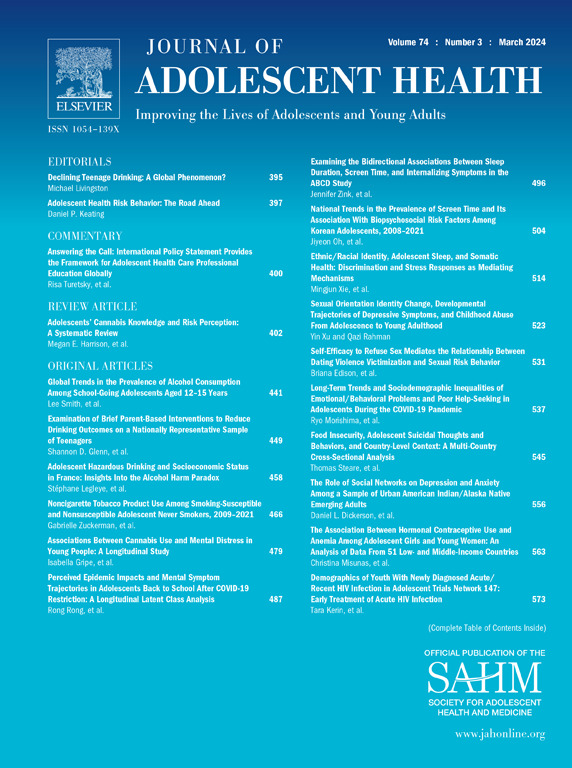Daily Oppression-Based Stressors, Social Support, Suicide Ideation, and Nonsuicidal Self-Injury Ideation Among Sexual and Gender Minority Adolescents
IF 5.5
2区 医学
Q1 PEDIATRICS
引用次数: 0
Abstract
Purpose
Sexual and gender minority adolescents (SGMA) are at heighted risk for suicide ideation (SI) and nonsuicidal self-injury ideation (NSSII) compared to their heterosexual and cisgender counterparts. Oppression-based stressors are posited to explain these disparities. However, there is limited research examining protective factors that mitigate the impact of oppression-based stressors. We conducted a 28-day daily diary study to test the moderating effects of daily general and SGM-affirmative social support on the associations between oppression-based stressors and SI and NSSII among SGMA.
Methods
Participants were 92 SGMA, ages 12–19 years (M = 16.28; standard deviation = 1.77; 52% cisgender; 61% White, non-Hispanic/Latine). Participants completed one daily survey per day over a 28-day monitoring period and demonstrated high compliance.
Results
On days SGMA experienced greater oppression-based stressors than their average, they had a greater likelihood of reporting same-day SI and NSSII. On days SGMA had greater SGM-affirmative social supports than their average, they had a lower likelihood of endorsing samde-day SI but not NSSII. General social supports were not associated with a lower likelihood of endorsing SI or NSSII. The interactions between all social supports and oppression-based stressors were not significant for SI or NSSII.
Discussion
The novel results underscore the harm oppression-based stressors inflict on SGMA's mental health, and highlight the unique importance of SGM-affirmative support in reducing risk for daily SI. Suicide interventions for this population may need to target SGM-affirmative social supports and exposure to or impact of oppression-based stressors.
性少数与性别少数青少年的日常压迫压力源、社会支持、自杀意念与非自杀自伤意念。
目的:与异性恋和顺性青少年相比,性少数和性别少数青少年(SGMA)有较高的自杀意念(SI)和非自杀自残意念(NSSII)的风险。基于压迫的压力源被认为可以解释这些差异。然而,关于减轻基于压迫的压力源影响的保护因素的研究有限。我们进行了一项为期28天的每日日记研究,以检验日常一般社会支持和sgm肯定性社会支持对SGMA中基于压迫的压力源与SI和NSSII之间的关联的调节作用。方法:参与者为92名SGMA,年龄12-19岁(M = 16.28;标准差= 1.77;cisgender 52%;61%为白人,非西班牙裔/拉丁裔)。参与者在28天的监测期内每天完成一项每日调查,并表现出很高的依从性。结果:在SGMA经历更大的基于压迫的压力源的日子里,他们报告同一天SI和NSSII的可能性更大。在SGMA获得比平均水平更高的sgm肯定社会支持的日子里,他们支持当天SI的可能性较低,但不支持NSSII。一般的社会支持与赞同自杀或非自杀的可能性较低无关。所有社会支持与基于压迫的应激源之间的相互作用在自残和自残中均不显著。讨论:新的结果强调了基于压迫的压力源对SGMA的心理健康造成的伤害,并强调了sgm肯定支持在降低日常SI风险方面的独特重要性。针对这一人群的自杀干预措施可能需要针对sgm肯定的社会支持以及对基于压迫的压力源的暴露或影响。
本文章由计算机程序翻译,如有差异,请以英文原文为准。
求助全文
约1分钟内获得全文
求助全文
来源期刊

Journal of Adolescent Health
医学-公共卫生、环境卫生与职业卫生
CiteScore
10.40
自引率
3.90%
发文量
526
审稿时长
46 days
期刊介绍:
The Journal of Adolescent Health is a scientific publication dedicated to enhancing the health and well-being of adolescents and young adults. Our Journal covers a broad range of research topics, spanning from the basic biological and behavioral sciences to public health and policy. We welcome a variety of contributions, including original research papers, concise reports, literature reviews, clinical case reports, opinion pieces, and letters to the editor. We encourage professionals from diverse disciplines such as Anthropology, Education, Ethics, Global Health, Health Services Research, Law, Medicine, Mental and Behavioral Health, Nursing, Nutrition, Psychology, Public Health and Policy, Social Work, Sociology, and Youth Development to share their expertise and contribute to our mission of promoting adolescent health. Moreover, we value the voices of young individuals, family and community members, and healthcare professionals, and encourage them to submit poetry, personal narratives, images, and other creative works that provide unique insights into the experiences of adolescents and young adults. By combining scientific peer-reviewed research with creative expressions, our Journal aims to create a comprehensive understanding of the challenges and opportunities in adolescent and young adult health.
 求助内容:
求助内容: 应助结果提醒方式:
应助结果提醒方式:


